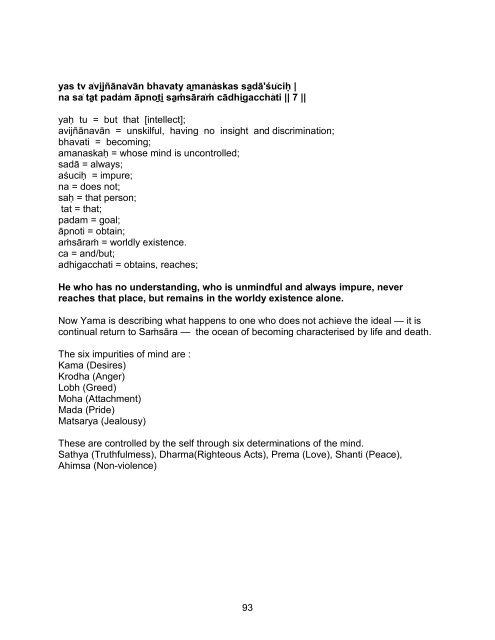KathaUpanishad
You also want an ePaper? Increase the reach of your titles
YUMPU automatically turns print PDFs into web optimized ePapers that Google loves.
yas tv a̍vi̱ jñāna̍vān bhavaty a̱mana̍ skas sa̱ dā'śu̍ciḥ |<br />
na sa̍ ta̱ t pada̍ m āpnoṯi̱ sa̱ ṁsāra̍ṁ cādhi̱gaccha̍ ti || 7 ||<br />
yaḥ tu = but that [intellect];<br />
avijñānavān = unskilful, having no insight and discrimination;<br />
bhavati = becoming;<br />
amanaskaḥ = whose mind is uncontrolled;<br />
sadā = always;<br />
aśuciḥ = impure;<br />
na = does not;<br />
saḥ = that person;<br />
tat = that;<br />
padam = goal;<br />
āpnoti = obtain;<br />
aṁsāraṁ = worldly existence.<br />
ca = and/but;<br />
adhigacchati = obtains, reaches;<br />
He who has no understanding, who is unmindful and always impure, never<br />
reaches that place, but remains in the worldy existence alone.<br />
Now Yama is describing what happens to one who does not achieve the ideal — it is<br />
continual return to Saṁsāra — the ocean of becoming characterised by life and death.<br />
The six impurities of mind are :<br />
Kama (Desires)<br />
Krodha (Anger)<br />
Lobh (Greed)<br />
Moha (Attachment)<br />
Mada (Pride)<br />
Matsarya (Jealousy)<br />
These are controlled by the self through six determinations of the mind.<br />
Sathya (Truthfulmess), Dharma(Righteous Acts), Prema (Love), Shanti (Peace),<br />
Ahimsa (Non-violence)<br />
93


















